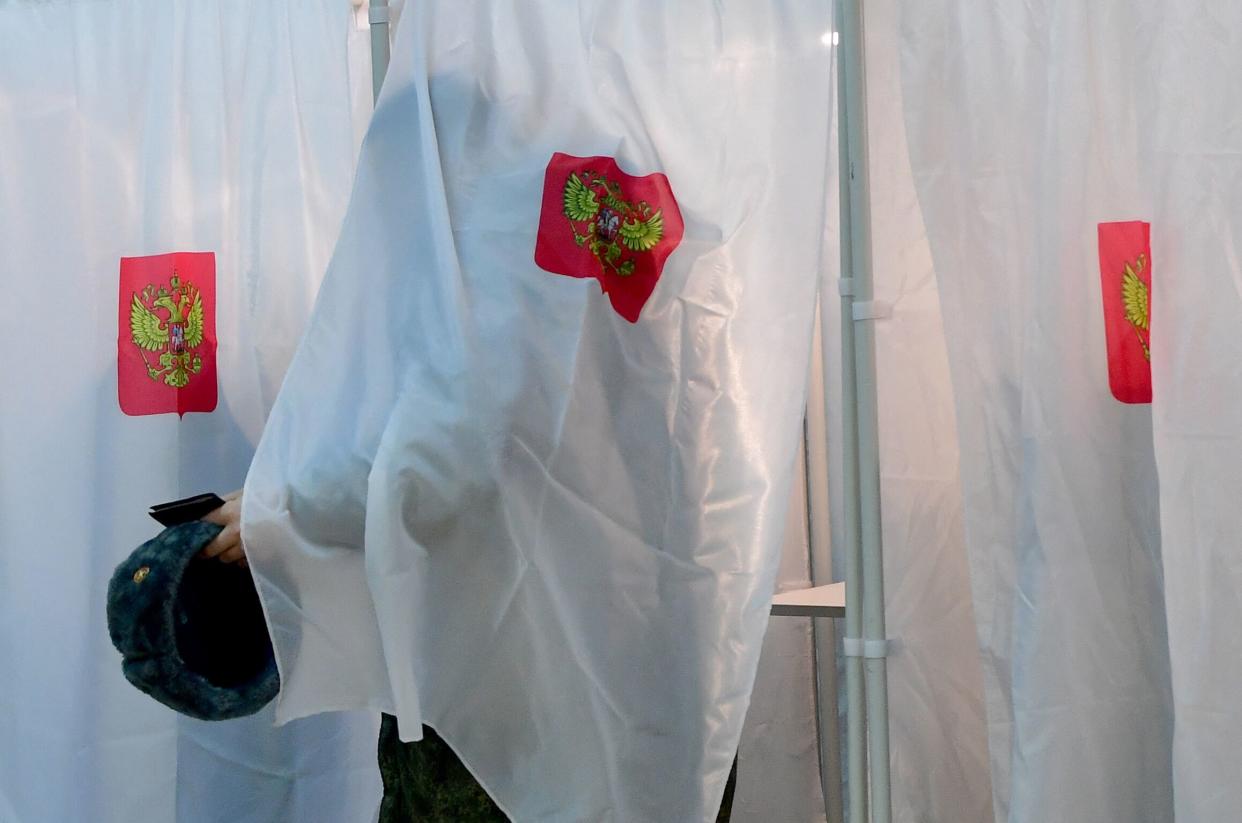Putin Heads for a Record Win in Election Without Real Challenger

(Bloomberg) -- Vladimir Putin is poised for a record victory in Russia’s presidential election that will allow the Kremlin to claim he has overwhelming public support to pursue his war in Ukraine and confrontation with the West.
Most Read from Bloomberg
Apple Is in Talks to Let Google Gemini Power iPhone AI Features
Musk Says His Ketamine Prescription Is in Investors’ Best Interests
Putin Warns Russia Won’t Stop After Predictable Election Win
Nvidia Backs Little-Known Upstart in India’s Biggest AI Bet Yet
The Russian leader’s on course to get more than 80% support when voting concludes on Sunday, based on results from exit polls, regional and government officials said, citing data available to them and asking not to be identified because the information isn’t public.
Putin received 77% of the vote in 2018 and the Kremlin has been determined to deliver a similarly high result this year to demonstrate that Russians are united behind him over the war. Three other candidates in the tightly controlled election all represent parties loyal to the Kremlin.
Turnout passed 69% by Sunday afternoon in Moscow, which didn’t include more than 4.3 million people who voted online, state television reported, citing Russia’s Central Election Commission. That exceeded the 67.5% turnout recorded in 2018.
Three days of voting are due to conclude in Russia’s westernmost Kaliningrad region at 9 p.m. Moscow time, with results of exit polling likely to be published shortly after.
Long lines formed at noon outside some polling stations, including in Moscow and St. Petersburg, after allies of opposition leader Alexey Navalny, who died last month in an Arctic prison camp, called on people to protest Putin’s election by turning up at that time. Their presence represented a muted sign of defiance amid the harshest Kremlin crackdown on dissent in decades.
The head of the Kremlin’s human rights council, Valery Fadeyev, said police should investigate people who spoiled ballot papers because they were “controlled from abroad,” the state-run Tass news service reported.
Already Russia’s longest-serving leader since Soviet dictator Josef Stalin, 71-year-old Putin is set to extend his nearly quarter-century rule by another six years at a time his troops are on the offensive in Ukraine. Russia is pressing its advantage in the third year of the invasion as Ukraine struggles to supply its forces with munitions amid delays in military aid from its US and European allies.
Putin Eyes New World Order After Crushing Opposition in Russia
Russia’s wartime economy has largely weathered the shock of unprecedented international sanctions, thanks to a continuing flow of energy revenues and a massive injection of government spending to support the defense industry and shield domestic businesses. Trade with China is booming as Russia reorients its economy away from markets in Europe.
“In the last two years, the Putin regime has rebuilt every element of itself to adapt to a permanent state of war,” said Andrei Kolesnikov, a senior fellow at the Carnegie Endowment for International Peace.
Ukraine has waged an intensified campaign of drone attacks aimed at key Russian infrastructure including oil refineries ahead of the election. Authorities said the refinery in Slavyansk-on-Kuban in the southern Krasnodar region was hit overnight, causing a fire that was later extinguished, after several plants were targeted on Saturday.
More Russian Oil Refineries Are Attacked by Ukrainian Drones
The Russian Defense Ministry said it repelled 35 drone attacks in eight regions overnight, including around Moscow. Authorities briefly restricted operations of three of Moscow’s airports on Sunday after a drone was downed near the Domodedovo area of the capital.
Putin dismissed prospects for a halt to the war in a televised interview on Wednesday, saying he’s not interested in a “pause” that would allow Ukraine to re-arm. Russia wants written security guarantees to end the fighting and the “realities on the ground” should be the basis for any negotiations, he said.
Russia occupies about a fifth of Ukraine including Crimea, which it annexed in 2014. Putin in 2022 declared four regions of eastern and southern Ukraine to be “forever” part of Russia, even as his forces don’t fully control them.
Russia organized voting in the presidential election in occupied areas of Ukraine. The foreign ministry in Kyiv said the votes were illegal and called on Ukrainians in the territories not to take part in the “pseudo-elections.”
How Putin Engineers Longest Russia Rule Since Stalin: QuickTake
Putin voted online Friday, avoiding the traditional visit to a polling station that he’s made in past presidential elections. The government said more than 4.5 million people registered to vote via a system that’s being used for the presidential ballot in 29 of Russia’s regions for the first time.
Critics say the system may make it harder to identify fraud in the results.
Russia didn’t invite observers from the Organization for Security and Cooperation in Europe to monitor the election. The OSCE said in January this was evidence that “democratic backsliding” had reached a critical point.
Despite the predictability of the vote, Russian officials are in no mood to admit shortcomings in the election.
“We won’t tolerate criticism of our democracy any longer,” Kremlin spokesman Dmitry Peskov told a youth conference in Moscow earlier this month. “Our democracy is the best.”
Most Read from Bloomberg Businessweek
China’s Super-Cheap EVs Offer Hope for Average American Buyers
Dollar’s Superpower Status at Risk From Turmoil at Home and Abroad
An Influential Economics Forum Has a Troubling Surplus of Trolls
©2024 Bloomberg L.P.



